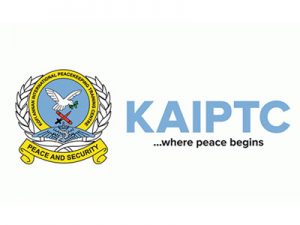Logistics In Peace Support Operations Course 2024 (LOGPSOC 24)
Peace Support Operations

Course Fee: This is a sponsored course hence KAIPTC shall be responsible for tuition, accommodation, transportation (airport arrival/departure) and feeding for the duration of the course. However, KAIPTC shall NOT be responsible for external participant’s (outside Ghana) ticket for travel. Participants who will require visa on arrival will also be responsible for the cost of their visas.
Terms and Conditions:
- The course will be conducted ONLY in English;
- Every participant will have to prove adequate health insurance coverage, which should include Covid 19 before travelling to the Centre. Additionally participants must have been vaccinated and possess a COVID-19 and yellow fever vaccination cards. Those who have not taken the COVID-19 vaccine must be ready to undergo a PCR test if need be. KAIPTC will not bear any health or accident costs for any participant.

| In short | |
| Course Date/Duration | 8 – 19 July 2024 |
| Course Capacity | 25 participants |
| Target Group | The target groups include those involved in logistics planning and support to Peace Support Operations. These include the following;
|
| Course Language | English |
| Application Deadline | 5 April 2024 |
Introduction/Background
- Kofi Annan International Peacekeeping Training Centre (KAIPTC) through its needs based and demand-driven strategic model identified Logistics Planning and Management for Peace Support Operations (PSO) as a critical challenge in Member States of the AU and ECOWAS, with states requiring their capacity to be strengthened in terms of human resource and preparations for such operations. The shifting forms of conflict and violence on the continent to which the AU and ECOWAS are expected to respond to, calls for realignment of PSO to deal more effectively with these emerging and existing threats. Experience so far indicates PSO are rather complex with respect to logistic support and comes with a myriad of challenges.
- Some of the specific challenges identified were preparation toward deployment to PSO by Troop Contributing Countries (TCC), challenges in sustaining COE to meet established criterion for reimbursement and management of COE in the mission. These challenges were attributable to a host of issues including the lack of adequate human resource capacity. Due to this, KAIPTC secured funding from the German Government to research, develop and train Military, Police and Civilian personnel on the continent to enhance and harmonize logistic planning and management processes for PSO.
- Thus, the response to the challenges posed by the scale and scope of field mission deployments must therefore be considered in light of the demands for well-trained logisticians. Logistics training including Training of Trainers Logistics training are essential. Tactical level training for Mission Staff on managing logistics and specifically dealing with COE is key. Harmonized training standards and curriculum are also key to the effectiveness of any PSO and of the ASF, particularly across the Regional Economic Communities (RECs). This course would help to enhance the capacity of ECOWAS, AU, and their relevant structures to perform their mandates in ensuring peace and security in Africa.
Course Rationale
- The Course was designed in collaboration with the AU and ECOWAS to train and enhance the capacity of logistics planners and managers on the African continent concerned with the planning, management and liquidation of logistics for PSO. Building the human resource capacity of logistics planners and managers ensures quick response and shortens the time lag from when decisions are taken, commitment from member states as well as donors are made and actual deployment. This also ensures professionalism is achieved; accountability is in place, transparency, flexibility, and adoption of common standards.
Course Aim
- The aim of the Course is to enhance the capacity of participants for the smooth planning and management of logistics to facilitate the conduct of peace support operations on the continent.
Course Objectives
The main objectives of the course are to:
- Enhance participants’ Understanding of the reforms in the UN System and how UN peace missions are supported.
- Deepen Understanding of the ASF and ESF architecture and their operations.
- Know COE requirements, management and the system of reimbursements.
- Deepen knowledge on operational logistics.
- Understand the logistics planning process and be able to plan for a Peace Support Operation.
Target Group
The target groups include those involved in logistics planning and management of Peace Support Operations. These include the following;
- Military, Police and Civilian participants from Peace Support Missions in Africa.
- African Union, ECOWAS and other RECs such as Economic Community of Central African States (ECCAS) and the Intergovernmental Authority on Development (IGAD).
- Logistics Personnel from Troop Contributing Countries (TCC)/Member States.
- Personnel from other TCEs.
Training Methodology
Through a combination of lectures, simulation exercises, video/movie presentations, group work, role-plays, case study analysis, quizzes and discussions, the course seeks to enhance participant’s theoretical as well as practical understanding of logistics planning and management in PSOs. Participants will play active roles in the learning process under the guidance of a team of experienced facilitators. Following the completion of each module, participants will be encouraged to participate in, group discussions to further their understanding of the concepts.
Modules of the course
- The following modules will be covered:
-
- The UN, AU and ECOWAS Systems and Integrated Mission Support for peace operations.
- SOFA, MOU and COE planning & management.
- Strategic and Operational logistics imperatives for TCC
- Logistics Planning in Peace Support Operations. (RSOI, Reconnaissance of potential mission areas)
- Logistics Management and liquidation in PSO.
- Gender considerations PSO Logistics
- Technical Staff Checks.
- Final Exercise.
-
How to Apply
Interested applicants are requested to kindly fill and submit an online application form not later than 26 November 2023. Access the application by pressing the “How to Apply” button.
Contact at KAIPTC
| Mrs Marylyn Agblor
Training Coordination Officer Tel. 00 233 (0) 302 718200 Ext. 1012 Fax. 00 233 (0) 302 718201 Email: marylyn.agblor@kaiptc.org Email: training.coordination@kaiptc.org
Col Daniel Agbekor Course Director Tel. 00 233 (0) 302 718200 Ext. 1035 Fax. 00 233 (0) 302 718201 Email: Daniel.amenyo-agbekor@kaiptc.org |

